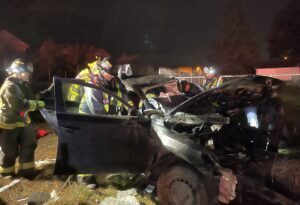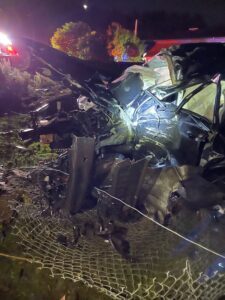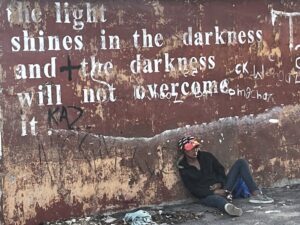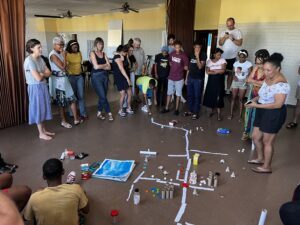Bob Ekblad's Blog, page 4
November 21, 2023
Spirit at Work: Healing, Empowerment, Revelation, Salvation
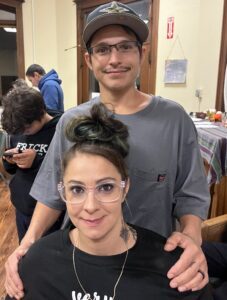 As we seek to share the liberating message of Jesus through personal visits, ministry on the street, Bible studies and teaching we’ve come to recognize over and over that it’s not about transmitting knowledge so people can amass facts about God, Jesus, and the Bible. We all need the living Word to pierce our hearts, making it through our indifference, negative expectations, and defenses. This is the work of the Holy Spirit, who reveals, reminds us, and others of Jesus’ teaching, pointing us in the right direction as we call, visit, approach people, and write articles and books.
As we seek to share the liberating message of Jesus through personal visits, ministry on the street, Bible studies and teaching we’ve come to recognize over and over that it’s not about transmitting knowledge so people can amass facts about God, Jesus, and the Bible. We all need the living Word to pierce our hearts, making it through our indifference, negative expectations, and defenses. This is the work of the Holy Spirit, who reveals, reminds us, and others of Jesus’ teaching, pointing us in the right direction as we call, visit, approach people, and write articles and books.
Jesus recognized that his own example and teaching were not enough for his disciples to bear witness, continuing his movement after his death, resurrection, and ascension.
“I am sending forth the promise of my Father upon you; but you are to stay in the city until you are clothed with power from on high” (Lk 24:49).
Once they’d received the empowerment of the Spirit at Pentecost, they stepped into their spiritual authority and were led by the Spirit to exercise gifts of the Spirit like healing the sick, receiving inspired revelation, prophesying, discerning, and casting out evil spirits…
The last verse of Mark’s Gospel states clearly what we need and expect. “And they went out and preached everywhere, while the Lord worked with them, and confirmed the word by the signs that followed” (Mk 16:20).
We pray regularly for physical healing at our Tierra Nueva Bible studies, street outreach and Sunday worship, and often hear that it happens.
Last week Mike, a strong, 61-year-old truck driving instructor told us how he’d been living with pain in his right shoulder that was worsening, making it hard to shift gears as he drove trucks and trained drivers. He shared how he’s always been wired outwards, thinking of how he can help people, and has struggled to receive for himself. Since he’d lost his health insurance after being unemployed and didn’t yet qualify for the health plan in his new job, he decided a few weeks back to do something he’d never done—to ask Jesus to heal him! After asking for healing for his right shoulder he said he slept like a baby, awaking to complete freedom from pain, which is gone for good.
While teaching Iranian underground church leaders in Armenia in mid-October, many received healing and were filled with the Holy Spirit in ways that brought refreshment and empowerment for ministry.
We often experience being guided by the Spirit as we seek out people on the streets. Last Friday night we were having trouble locating anyone as the police had been driving people away from the usual places where people gather. When we finally began finding people and served them hot drinks, I was offering to pray for people if they had any particular needs. Nearly everyone was responding: “No thanks. I’m good.”
After hearing these responses and knowing people were in dire need, I suddenly received what I think was an inspired word, which I shared with a group of younger men and women who were inhaling fentanyl smoke from foil they were heating up before me beside the dumpsters of a big box store.
“Actually, you don’t need me to pray for you. You can pray to God directly yourselves,” I said, “There are no barriers between you and God. God loves you just the way you are and wants to help you. There are no hoops you have to jump through, nothing you have to do to qualify. Jesus showed us this when he walked the earth, by freely caring for and openly loving those society excluded, and he’s still alive to help us now.”
A young woman looked up startled from her smoking foil and said “that’s exactly what my mother says. She’s a Lutheran pastor.” Another woman looked up, tears welling up in her eyes. It seemed the Spirit enabled the Word to reach people’s heart. This inspires us to keep watching and expecting the Spirit’s guidance and direct action, which brings the Kingdom of God to the streets.
A woman who attends Tierra Nueva named Kristen (pictured above with her husband Eliazar) and her brother Gavin were miraculously spared from death when their car was hit by a speeding Amtrak train late one night (photos of car below). While she broke her back and Gavin was in critical care for over a month, both are recovering speedily as a result of prayer (listen to her testimony “Hit by a train but saved by Jesus” on my weekly podcast “Disciple: Word, Spirit, Justice, Witness” on Spotify or Apple).
November 20, 2023
Can War Be Just? – By Aaron White
 I don’t think I have to convince anyone that war is evil. We all know that it is.
I don’t think I have to convince anyone that war is evil. We all know that it is.
Here are the statistics for three ongoing wars, as of Nov 18, 2023:
Stats:
Russo-Ukraine War: since 2014, 514,000 deaths, most of those in the past year since the Russian invasion.Israel-Palestine War: 40 consecutive days of fighting; 1400 Israelis killed and 240 hostages in the Hamas attack on Oct 7; more than 11,000 Palestians killed, two-thirds of whom are women and children; 2700 missing. Hospitals have been destroyed. Refugee camps bombed. Homes, churches, and the entire infrastructure of an already desperately poor area have been wiped out. Yemen Civil War: UN estimates over 377,000 killed by the end of 2021, more than half of those because of humanitarian crisis as a result of the war – displacement, starvation (more than half the population facing starvation), disease. 4 million people displaced from their homes in Yemen.108.4 million forcibly displaced peoples, as of the end of 2022. Primary cause is war.One of the main results of displacement is that children become more and more vulnerable to sexual exploitation, slavery, and being turned into child soldiers. Since 2005 there are a verified 105,000 children who have been recruited and used as child soldiers – a uniquely horrific aspect of modern war. Children are seen as a cheap, dispensable, effective weapon of terror (See Romeo Dallaire, They Fight Like Soldiers, They Die Like Children).War is evil. But is war a necessary evil? Is it sometimes required? Could it even be just?
I took a military history degree at the University of Victoria to try to understand something I believed I would never experience personally: war and killing. I discovered that Christians throughout the last two millennia have gone to great lengths to explain war and to justify its continued use as an instrument of the state. St. Augustine, who had first-hand experience in a city under siege, wrote The City of God in the 5th century. In it he gave a series of justifications for when, why and how Christians should fight and kill. Erasmus of Rotterdam, the 16th century Christian Humanist, made a strong argument that Christian nations should never go to war against each other, but allowed that it was still acceptable for Christians to fight in self-defence, as a last resort, and against Muslims. Hugo Grotius in the 17th century developed a theory of Natural Law that put limits and rules on warfare, but still assumed that Christian nations would always find the need to go to war. Carl von Clausewitz in 19th century Prussia developed a doctrine of Absolute War, where the entire might of the State – military, political, economic, social, and spiritual – should be employed to effect the entire destruction of one’s enemy. This demonic doctrine was adopted by the European military thinkers in advance of WW1 and WW2.
At the Second Vatican Council (1962-1965) an attempt was made to propose that warfare as a tool of the state – in particular unlimited, nuclear warfare – was immoral. The proposal was severely watered down in order to continue to allow states to engage in war when they found it necessary.
Even now with wars raging around the world, and some of the major participatory countries being led by professing Christians, we face the debate: is it ok – even necessary, even just and right – for Christians to fight and kill in war?
In the past the responsibility for deciding whether or not a war was just lay with the “prince” – the sovereign of the nation. The prince would bear the moral responsibility of the war, and therefore an ordinary Christian soldier could presumably engage in warfare without worrying if he was sinning, so long as his conduct within the war met certain standards. We do not have that moral luxury now (and it is questionable whether anyone really had that moral freedom). In a democracy we must bear responsibility for the leaders we choose and the actions that our nation takes.
So how can we decide if a war is just, or if any war can be just? Five to Seven principles were traditionally evaluated for the determination of whether a war was “just” or not: Just Cause; Right Intent; Net Benefit; Legitimate Authority; Last Resort; Proportionality of Means; and Right Conduct. Traditionally a war must meet certain requirements to be considered just. Two of the most important of these requirements are the separation of combatants and non-combatants; and ensuring that any military response is both appropriate and limited.
There is now no clear distinction between combatants and non-combatants. Wars are very infrequently fought in our age between two armies in a field. More often it is trained soldier versus unofficial insurgent (or revolutionary/freedom fighter), or even civilian against civilian. Those who deal in terror see civilians as primary targets. National militaries say they are able to avoid bombing hospitals and schools (though evidence proves otherwise); but sometimes nation-states don’t even try. It is hard to forget the infamous saying that came out of the Vietnam War: “It became necessary to destroy the town to save it.”
And when biological, chemical, nuclear weapons or other weapons of mass destruction are used or threatened, there are no civilians or combatants, only victims. The notion of appropriate and limited response is likewise obliterated. The Old Testament principle was eye for an eye, tooth for a tooth (Lev 24-19-21). This was a limitation on retaliation. If someone knocked out your tooth, you were not allowed to kill him or her in revenge. You could only take their tooth/the monetary value of a tooth, which was carefully regulated. This is the basis behind appropriate and limited responses. It is not considered “just” to kill 10,000 people if your enemy has killed 100 of your people. Of course, modern weapons take us into the possibility of indiscriminately killing millions at a time, of destroying entire cities through bombardment, even of the elimination of all human life from the planet. We really have moved beyond the realm of measured responses.
But even this, which should make modern war unjust by biblical and even secular standards, is not the real issue for Christians. Jesus took us away from the “eye for an eye” formula. He took us to radical forgiveness and love. “You have heard that it was said, ‘Eye for eye, and tooth for tooth.’ But I tell you, do not resist an evil person. If anyone slaps you on the right cheek, turn to them the other cheek also….You have heard that it was said, ‘Love your neighbour and hate your enemy. ‘ But I tell you, love your enemies and pray for those who persecute you, that you may be children of your Father in heaven.” (Matthew 5:38-45)
This is not woke idealism, not armchair social media virtue signalling. Jesus lived in Judea under the thumb of an oppressive Roman regime that regularly crucified thousands of people to quell rebellion. His family were displaced, twice, by state control and violence at his birth. They were refugees to Egypt. He healed a Roman centurion’s servant, and also one of the guards who came to arrest him. As he healed the man he said “Enough of this!” to his disciples (Luke 22:51). In Matthew’s Gospel he said, “Put your sword back into its place; for all those who take up the sword shall perish by the sword” (Mt 26:52).
Canadian songwriter Leonard Cohen looked at the example of Jesus, and the state of the world, and wrote the line, “Give me Christ or give me Hiroshima.”
Which then do we choose, as Christians? Christ, or Hiroshima? How do we justify taking a human life, a life for which Jesus died, even if we categorise that person as an enemy? We know that we have responsibilities as Christians to care for the poor, the orphan, the widow, the stranger, the sick, the imprisoned – we know this because we have been commanded by Jesus. But we have also been given clear instructions from Jesus, and from New Testament letters, about our responsibilities towards our enemies:
“Let love be genuine; hate what is evil, hold fast to what is good; love one another with mutual affection; outdo one another in showing honour. Do not lag in zeal, be ardent in spirit, serve the Lord. Rejoice in hope, be patient in suffering, persevere in prayer. Contribute to the needs of the saints; extend hospitality to strangers.
Bless those who persecute you; bless and do not curse them. Rejoice with those who rejoice, weep with those who weep. Live in harmony with one another; do not be haughty, but associate with the lowly; do not claim to be wiser than you are. Do not repay anyone evil for evil, but take thought for what is noble in the sight of all. If it is possible, so far as it depends on you, live peaceably with all. Beloved, never avenge yourselves, but leave room for the wrath of God; for it is written, ‘Vengeance is mine, I will repay, says the Lord.’ No, ‘if your enemies are hungry, feed them; if they are thirsty, give them something to drink; for by doing this you will heap burning coals on their heads.’ Do not be overcome by evil, but overcome evil with good.” Romans 12:9-21
With these direct commands from our Lord, and from Scripture, why have we tried so hard to justify this killing? Why have we spent so much mental energy attempting to prove why it is acceptable to destroy the life God created, and for whom Jesus died?
For many of us this question only really presents itself in theory: what would I do if? It is easy enough to talk about non-violence when no one is threatening the things you hold dear, quite another to refrain from violence when the threat is in your home. Strong arguments are made on behalf of self-defence, or better still, defending the innocent from aggression. Do I understand the anger and desire for vengeance of those Israeli families who lost loved ones in the attacks by Hamas? Of course. Do I understand the anger and desire for vengeance of those Palestinian families who have lost loved ones in the violence and oppression they have endured since 1948? Of course. Does this justify the taking of lives, including the indiscriminate taking of lives? Because make no mistake, when war happens, it is always the poor and the vulnerable who suffer the most.
But can we remove ourselves from this moral conundrum by saying that we aren’t the ones doing the killing or hurting the vulnerable? Well, we actually aren’t as removed from the situation as we think. War profiteering: making profits off of war, the creation and sale of death-dealing weapons.
Bob Ekblad has highlighted the following with regards to American war-profiteering: Congress recently approved 14 billion for arms to Israel, 61 billion arms to Ukraine. This has been portrayed as a generous support for US allies, but who is actually getting that money? US weapons manufacturing companies. The fact that American taxpayers are directly subsidising US companies like Lockheed Martin, Northrup Grumman, Raytheon, and General Dynamics make ordinary citizens direct participants in and beneficiaries of the killing and destruction. The stock prices for major weapons manufacturers in the defense sector have increased significantly since Hamas’ terrorist attack against Israel on October 7, and Israel’s subsequent bombing campaign and invasion of Gaza, as stated by Bryan Quinn in the special report on October 26, “The business of war: How arms industry profits from violent conflicts.”
“Morgan Stanley and TD Bank hope for aerospace and weapons boon after a 7% value increase from start of Israel-Hamas conflict,” writes Eli Clifton in his article “Hamas has created additional demand’: Wall Street eyes big profits from war.”
So, the poor are destroyed and the wealthy – particularly those concerned with the manufacture of weapons – get profoundly wealthier. But is this just happening in America? Canadian arms manufacturers exported an estimated 1 billion worth of weapons in 2022. The Canadian government approved 33 million dollars towards missiles in the Ukraine. Over 21 million dollars in military goods were sold to Israel in 2022. In 2015 a 15 billion dollar deal was struck to send military equipment to Saudi Arabia, weapons which have been used in the civil war in Yemen.
Then there is the matter of United Nations voting. On Oct 28 there was an emergency UN Vote which called for an “immediate, durable and sustained humanitarian truce” in Gaza. “Many considered the resolution to be the last opportunity to prevent the bloody and devastating ground assault that was subsequently launched on Gaza by Israel. The resolution was sponsored by Jordan and passed with 120 votes in favour, 14 against and 45 abstentions. In addition to calling for a truce, it also called for all parties to respect international humanitarian law and allow the “continuous, sufficient and unhindered” provision of humanitarian aid into Gaza. The resolution also called for the “immediate and unconditional release” of all civilians held captive” (“Canada Fails Humanity With Abstention on UN Vote,” https://www.cjpme.org/pr_2023_10_28_unga).
Canada abstained from this vote.
On Nov 15 PM Justin Trudeau, evoking some of the ideas of Just War theory, said, “Even wars have rules. All innocent life is equal in worth. Israeli and Palestinian.” Trudeau asked for “maximum restraint” from Israel, but did not call for a ceasefire. Nations are wary about demanding ceasefires from other nations, because they can’t risk their own sovereignty – their own political right to defend their borders and interests, to retaliate, to wage war.
However, I want to reiterate that for Christians, our primary engagement with this issue must not be political. We do not put our ultimate trust in nations, in the UN, in militaries. Psalm 20:7 – some trust in chariots some in horses but we depend on the Lord our God.
No, these horrific situations of war, and the seeming inability or lack of interest in the world to prevent them, should starkly remind us that there is a deeper reality. This is what the word Apocalypse means – to see behind the veil. There is an enemy of humanity, the thief who wants to steal, kill and destroy. War-making and war-profiteering and the destruction of the poor, the vulnerable, the innocent, the children, are all done in allegiance with this enemy. We are called to see this deeper reality, this spiritual truth. We are called to commit our lives not to the worldly appearance of truth, but to this deeper spiritual truth, revealed to us by the Spirit of God, in and about Christ Jesus. We are invited into the life of Jesus, the one who took in the sword rather than take up the sword. We are called to be utterly different. And the tragic reality is that Christians in this world, by and large, have not been very different at all. They have instead been some of the loudest in the support and justification of violence and war.
The way of Jesus is difficult, and might even appear impractical or impossible. But this does not excuse us from trying to live it, if this is what Jesus has called us to. And I believe it is.
Jesus calls us to a place of no rights, no retaliation, and no security except what he gives us. His teaching on revenge and suffering and the example he gives of self-sacrifice are clear, though they do not say what we want to hear. Justice will be done, and aggressors will be held accountable, but we must trust that this final judgement will be in the hands of the Lord. Whenever we try to execute that kind of judgement, too much that is good is destroyed along with the bad – just as Jesus explained in the Parable of the Wheat and Weeds (Matthew 13:24-30).
Here is Jacques Ellul, a man who lived through the Second World War, on the illusory danger of the Christian championship of violence:
“If I think that I cannot reach others except by participating in their revolt, their anger and hatred; if I think that Christ’s consolation is a deluding lie and reconciliation a hypocrisy, then I no longer believe that the coming kingdom is truly present, and I no longer believe in the Resurrection. And because in the depths of my heart I no longer believe these things, I substitute for the Resurrection my mythological picture of it, and I decide that I should have to build the kingdom on earth with my own hands. This unbelief is the truth of Christian championship of violence. All the rest is illusion.” – Jacques Ellul
Let us pray and live that we do not carry on in this illusion, which is the championship of violence.
November 11, 2023
Challenging War Profiteering with Jesus’ Prophetic Alternative
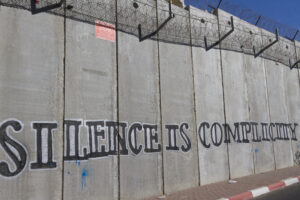 When Hamas militants massacred 1200 people inside Israel and carried 240 hostages into Gaza on October 7, they succeeded in provoking the State of Israel to unleash its wrath on Palestinians living in Gaza. The Palestinian death toll of largely civilians and children is rising daily—now nearly ten times more than the original 1200 victims. Weapons manufacturers, the oil industry and larger economy are profiting from this war.
When Hamas militants massacred 1200 people inside Israel and carried 240 hostages into Gaza on October 7, they succeeded in provoking the State of Israel to unleash its wrath on Palestinians living in Gaza. The Palestinian death toll of largely civilians and children is rising daily—now nearly ten times more than the original 1200 victims. Weapons manufacturers, the oil industry and larger economy are profiting from this war.
How might followers of Jesus challenge these injustices and offer life-giving alternatives in the face of increasing death and destruction?
The Israeli Defense Forces are responsible for the death of over 11,000 Gaza residents, 40% of whom are children— now some 160 kids a day! See Chris Hedges recent report here. In addition, Israeli bombs are destroying residences, hospitals, businesses, and the entire infrastructure, displacing hundreds of thousands of civilians, with no end in sight.
The United States is backing Israel 100%, providing billions of dollars in military assistance. President Joe Biden got Congress to approve $14 billion for weapons for Israel, and another $61 billion for Ukraine. This is enriching the American defense industry, adding to their already gluttonous profits from the war in Ukraine. The fact that American taxpayers are directly subsidizing US companies like Lockheed Martin, Northrup Grumman, Raytheon, and General Dynamics make ordinary citizens direct participants in and beneficiaries of the killing and destruction.
These companies produce implements of death, such as tanks, artillery ammunition, precision-guided munitions, small diameter bombs, ammunition, Iron Dome interceptors, Hellfire missiles, drones…
Looking at the websites of RTX, Lockheed Martin, and General Dynamics you see nice faces, official commitments to Diversity, Equity, and Inclusion and human rights. But it’s all a façade as what these companies produce brings horrific suffering and death.
The death toll in Gaza is rapidly rising, provoking reactions from other militant groups in solidarity with Palestinians, causing Arab nations to rally together against Israel, increasing the likelihood of a regional war.
Isaiah’s prophets foretell the coming of God himself and the Messiah, who will destroy weapons of war directly.
“And he will judge between the nations, and will render decisions for many peoples; and they will hammer their swords into plowshares and their spears into pruning hooks. Nation will not lift up sword against nation, and never again will they learn war” (Is 2:4).
“For you [God] shall break the yoke of their burden and the staff on their shoulders, the rod of their oppressor, as at the battle of Midian. For every boot of the booted warrior in the battle tumult, and cloak rolled in blood, will be for burning, fuel for the fire” (Is 9:4-5).
Isaiah continues to clarify God’s movement in history, describing the one Christians and Messianic Jews identify as Jesus of Nazareth.
“For a child will be born to us, a son will be given to us; and the government will rest on his shoulders; and His name will be called Wonderful Counselor, Mighty God, Eternal Father, Prince of Peace. There will be no end to the increase of his government or of peace, on the throne of David and over his kingdom, to establish it and to uphold it with justice and righteousness from then on and forevermore” (Is 9:6-7).
When Jesus’ disciples, James and John wanted to call down fire from heaven in retributive violence against Samaritans for refusing entry to Jesus and his band as they made their way towards Jerusalem, Jesus rebuked them, saying:
“You do not know of what spirit you are of” (Luke 9:54).
Of what spirit are defense industry weapons manufacturers, their politician advocates, and religious legitimators?
Many Scriptures comes to mind, such as Jesus’ description of the “The thief comes only to steal and kill and destroy” (Jn 10:10).
Clearly Israel’s current bombing campaign, financed by the USA, the UK and Western European governments is accomplishing killing and destruction on a massive scale, as well as the ongoing war between Russia and the Ukraine. Theft of land through illegal Jewish settlements in the West Bank and the Russian invasion of Ukraine are direct causes of these conflicts.
Jesus himself identifies Mammon as the major power active in the world that commands human allegiance over and against God.
“No one can serve two masters; for either he will hate the one and love the other, or he will be devoted to one and despise the other. You cannot serve God and Mammon” (Mt 6:24).
Jesus’ words here alone state clearly to his disciples his “either-or” view towards wealth, providing Christians with a non-negotiable point of departure from the world’s way of viewing war profits, which must not be justified.
The stock prices for major weapons manufacturers in the defense sector have increased significantly since Hamas’ terrorist attack against Israel on October 7, and Israel’s subsequent bombing campaign and invasion of Gaza, as stated by Bryan Quinn in the special report on October 26, “The business of war: How arms industry profits from violent conflicts.”
“Morgan Stanley and TD Bank hope for aerospace and weapons boon after a 7% value increase from start of Israel-Hamas conflict,” writes Eli Clifton in his article “‘Hamas has created additional demand’: Wall Street eyes big profits from war.”
“As the US Government approves military aid to Israel, public monies directly enrich weapons manufacturers,” Kate Aronoff writes in her October 17, 2023 New Republic article “The People Who Profit When It Rains Bombs.”
“Citi analyst Jason Gursky told Barrons, “we do expect industry revenue to accelerate in 2024 and 2025 as higher spending bills passed over the past several years begin to make their way through the income statements of our coverage companies.”
“Members of Congress are free to benefit from these international conflicts through stock trades or campaign contributions,” writes Aronoff, who then gives disturbing details that show how people in power who stand to directly benefit financially from drawing Iran into this war are pushing for this.
When stockholders, pension plan beneficiaries and the entire US economy benefit financially from killing human beings and destroying infrastructures that sustain life, we also can be assured that we will reap what we are sowing.
Violence begets violence is visible in our current pandemic of mass shootings in the USA, arguably the fruit of our military-industrial complex, defined by Wikipedia as describing “the relationship between a country’s military and the defense industry that supplies it, seen together as a vested interest which influences public policy.”
Another possible “spirit” behind the desire of Jesus’ disciples to destroy the Samaritans who oppose him is “murder,” and “deception,” visible in Jesus’ prophetic critique of the religious leaders of his time.
“You are of your father the devil, and you want to do the desires of your father. He was a murderer from the beginning, and does not stand in the truth because there is no truth in him. Whenever he speaks a lie, he speaks from his own nature, for he is a liar and the father of lies” (John 8:44).
Recent allegations denied by Israel that the IDF used white phosphorous munitions in Gaza directly implicate the USA and specifically Arkansas’ Pine Bluff Arsenal in killing through tortuous burning from chemicals, described here in detail, denounced by Amnesty International here.
Prophetic exposure of atrocities and cover-ups is an essential task of Jesus followers now, as well as calls for an end to the killing and destruction. Followers of Jesus should recognize that supplying weapons to kill and destroy is in alignment with the ruler of this world, whose works Jesus came to destroy.
“The Son of God appeared for this purpose, to destroy the works of the devil” (1 Jn 3:8).
Jesus disarms his disciples when they try to defend him, and warns them clearly that the way of his kingdom excludes violence:
“Put your sword back into its place; for all those who take up the sword shall perish by the sword” (Mt 26:52).
Jesus clearly states his anti-rob-kill-and-destroy agenda in John 10:10. “I came that they may have life, and have it abundantly” (John 10:10).
Jesus tells his vindictive disciples James and John and us now today: “for the Son of Man did not come to destroy men’s lives, but to save them” (Lk 9:56).
May we repent of our alignment with and justification of the powers of death and even prayerfully pursue ways to protest and actively divest from systems that profit from killing and destruction. May we actively seek to re-orient ourselves afresh to the life-giving way of Jesus, visible in his teaching and witness in the Gospels. May we find ways to become peacemakers, seeking to be informed from a place of active solidarity with victims. In this way we can offer a positive witness in these dark and increasingly polarized times.
Check out my podcast, Disciple: Word, Spirit, Justice, Witness on Apple or Spotify.
Also check out “A Call for Repentance: An Open Letter from Palestinian Christians to Western Church Leaders and Theologians” here.
November 2, 2023
The Realism of Retaliatory Love
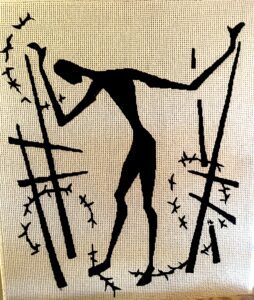 As I follow the daily news from Gaza, I find myself needing to actively resist feelings of anger, helplessness, and despair. I feel pressured to not only understand but justify Israel’s retaliatory and indiscriminate killing and destruction, based on its right to rescue its hostages, punish offenders, and defend its national security, or to justify Hamas’ killing, hostage-taking and escalating war based on historic and current injustices. What does it mean to actively pursue the way of Jesus as a viable alternative? How do we practice the Apostle Paul’s admonition:
As I follow the daily news from Gaza, I find myself needing to actively resist feelings of anger, helplessness, and despair. I feel pressured to not only understand but justify Israel’s retaliatory and indiscriminate killing and destruction, based on its right to rescue its hostages, punish offenders, and defend its national security, or to justify Hamas’ killing, hostage-taking and escalating war based on historic and current injustices. What does it mean to actively pursue the way of Jesus as a viable alternative? How do we practice the Apostle Paul’s admonition:
“Do not be overcome by evil, but overcome evil with good” (Romans 12:21).
I was horrified by Hamas’ attack on October 7. As I’ve traveled through that region and spent three months living on a Kibbutz I was able to envision it. I have deep sympathy for the families of the 1,400 killed, and for the hostages and their families. I recognize Hamas’ strategy of deliberately attracting Israel’s retaliatory violence against its own people, the Palestinians, to turn the Arab world and global public opinion against Israel. And I can also understand but how Israel reacted as they have.
Yet I can understand Palestinian rage as I’ve studied the history, visited and seen from a distance illegal Jewish settlements in the West Bank, witnessed Israeli soldiers firing rubber bullets on Palestinian youth, and heard first-hand accounts of atrocities committed by Israelis against Palestinians.
I am outraged by daily death tolls, and sickened by today’s update on the number of Palestinians killed in Gaza, 9,061– 3,760 of whom are children! Israel’s bombing of a refugee camp, a church, residential apartments, and possibly a hospital, show there is no safe place where human life is respected. The situation is dire and worsening, with ongoing killing, destruction of buildings, infrastructure, and much more death to come.
Lines are being drawn everywhere as people jump to defend Palestinians or Israel. Antisemitism is escalating in Europe and divisions between people are increasing as we all take sides. Sadly, Christians are caught up in the division, right when we have an opportunity to more fully embody and articulate Jesus’ refusal of violence, and alternate way of retaliatory love articulated clearly in Luke 6:27-28.
“But I say to you who hear, love your enemies, do good to those who hate you, bless those who curse you, pray for those who mistreat you.”
Though Jesus lived his life under the brutality of Roman imperial occupation, he never called for or justified retaliatory violence, and neither must we his followers today! Jesus called for and embodied active enemy love (Lk 6:27-36), practicing indiscriminate healing, deliverance and acts of compassion, including Jews and non-Jews alike.
Jesus raised a Jewish synagogue official’s daughter from the dead, healed a Roman centurion’s slave, delivered a Syrophoenician woman’s daughter from evil spirits and drew crowds from Syria and beyond (Mt 4:24-25). He refused retaliatory strikes against hostile Samaritans (Lk 9:55-56), and the use of violence for self-defense against those who came to arrest him (Mt 26:52). Jesus did this from a place of extreme realism regarding human nature, his own distinct mission, and the world around him, telling his followers:
“For nation will rise up against nation, and kingdom against kingdom; there will be earthquakes in various places; there will also be famines. These things are the beginning of birth pangs” (Mk 13:8).
He prophesied that lawlessness would increase as history unfolded, which we are certainly experiencing today. Jesus didn’t speak about the coming turmoil to justify or endorse it. Rather he warned his disciples of the dangers of their love growing cold, a warning we must urgently heed now:
“Because lawlessness is increased, most people’s love will grow cold. But the one who endures to the end, he will be saved” (Mt 24:12-13).
In the face of state violence and oppression, Jesus consistently embodied and openly stated his (and our) priorities:
“This gospel of the kingdom shall be preached in the whole world as a testimony to all the nations, and then the end will come” (Mt 24:14).
For Jesus the kingdom of heaven was not about establishing an earthly kingdom. Nor was Jesus about defending or expanding the State of Israel. Jesus prophesied and lamented the destruction of the temple and Jerusalem, calling his followers to flee to the mountains in the face of an invasion rather than take up arms (Lk 21:20-21). His lament came out of deep love for his Jewish brothers and sisters, who he and the Apostle Paul never gave up on– but never liberated or defended with the use of violence.
Jesus actively lived out his humble, non-violent, retaliatory love to the extreme, allowing himself to be condemned to death by his own people, and brutally executed by the Roman Empire. Jesus died on the cross to forever “break down the walls of division,” “abolishing in his flesh the enmity” (Eph 2:15), “putting to death the hostility” (Eph 2:16), “preaching peace to you who were far away, and peace to those who are near” (Eph 2:17).
Now is the time for followers of Jesus to make a clear and consistent break with normal human reasoning and justifications regarding violence and war. Otherwise, we present the world with a counter-witness to Jesus’ way of saving and announcing the kingdom of God!
In these polarizing times we must be careful to not bear witness from a place of judgment or condescension, but from a humble posture of seeking understanding, and informed solidarity with victims. Jesus leads the way in identifying with the victim by himself becoming a victim. He models extreme intercession, asking his Father to forgive the worst perpetrators of injustice and violence- those torturing and killing God himself!
In these times of war may our intercession and lamentation include Israelis and Palestinians, civilians and soldiers, Hamas and Hezbollah combatants, the Islamic Republic of Iran, and the Israeli Defense Force, children and adults, Muslims, Jews, and Christians. And while we’re at it let us include Russians and Ukrainians, Democrats and Republicans, liberals and conservatives, believers and non-believers, and anyone else who’s on the other side of whatever lines we’ve drawn.
Our intercession will also lead us to denounce injustices, pursue concrete peace-building activities, advocacy for the vulnerable, and other prophetic actions. May these actions be deliberately informed by indiscriminate love that refuses evil and drives away all fear. In this way we will offer the world an alternative that looks more and more like overcoming evil with good, rather than being ourselves overcome by evil.
It is true that “the word of the cross is foolishness”—or looks like it! However please remember it looks that way “to those who are perishing.” In contrast, “to us who are being saved [those actively drawn to Jesus and his way] it is the power of God” (1 Cor 1:18). May we knowingly embrace by faith the fragile-looking realism of the cross as God’s only weapon to defeat evil, and refuse all retaliatory violence.
Check out today’s podcast on this topic, “Engaging in Jesus’ activism in the face of war” on my weekly podcast “Disciple: Word, Spirit, Justice, Witness” via apple or spotify.
Also check out “A Call for Repentance: An Open Letter from Palestinian Christians to Western Church Leaders and Theologians” here.
October 15, 2023
Spirit-orchestrated Encounters
I’m amazed lately by how the Spirit seems to be orchestrating encounters with people on the streets. The timing of how these meetings happen is inspiring me to be even more attentive, so I can more consciously participate.
Last week I called the jail to see if they’d let me meet one-on-one with a prisoner I know from the streets. The Sheriff’s deputy told me that if I could get down there before 11:30am there would likely be a visitor booth that would be open by then for a short visit– but he couldn’t guarantee it. So, I drove the twenty-minutes to the jail, only to learn that all the booths were still full… but hopefully one would become available.
Just then the big metal door separating the inside of the jail from the outer corridor opened, and a man who was being released walked out, heading past me towards the front doors. I couldn’t see his face because he was wearing a mask, but I noticed his long, dark hair and thought I recognized him from somewhere. I searched my memory as to where I’d seen him, as he kept walking out into the jail parking lot.
I went over and sat down on a wooden bench opposite the attorney booths and read a few psalms. When one of the attorneys walked out, I got up and checked with the deputy to see if a booth was open.
“Not yet,” he said.
I sat down again and after a second attorney left I went again to the deputy, who then told me it was 11:45am and they were telling him there wasn’t enough time for me to visit. I left the jail defeated, and headed to my car, and drove out of the parking lot and headed towards town, pulling over at the jail bus stop to make a quick phone call.
Right after I pulled over, the man who’d passed me leaving the jail approached, and tapped my passenger window. I motioned for him to wait till I’d completed the call, and he nodded that he’d wait.
When I finished the call I lowered my window. Now with his mask off, a visibly Native American man who’d passed me in the jail, asked if I could give him a ride down to the Westside Bridge in town. I welcomed him into my car, and after taking a seat he asked me:
“There in the jail you looked as me like you know me. Do you know me from somewhere?”
“I think I do know you, but I’m not sure from where. Do you know me? I asked.
“No, I don’t know you,” he answered.
I suddenly recalled that I might have seen his face a week before in a traumatic event in downtown Mount Vernon. I had witnessed a group of police officers gathering around some grocery carts filled with the belongings of some unhoused people, who were not visible from the road. Others were wheeling stretchers up towards grocery carts.
Since there have been many recent overdose deaths, and we know many of the people on the street, I decided to park as close as I could get, which was right beside the aid car. I ran up towards the police officers, identifying myself, and then asking them if there were any overdose deaths.
“No, there’s no one dead yet, just two more affected by the bad batch of fentanyl that’s on the streets right now,” an officer told me.
He went on to share that lately they’ve needed 3-6 Narcans to revive people, if they could revive them.
I noticed a visibly Native American woman lying unconscious on the grass. Police officers were checking her vitals. Another man was being wheeled off in a gurney towards the aid car, who I had walked beside, praying for him. I wondered if this is where I had first seen this man who was now in the front seat of my car beside me.
“Did you by any chance have an overdose last week in Mount Vernon near the freeway onramp? Did the police come and take you off to the hospital?” I asked.
“Yes, I did overdose last week right there. After they took me to the hospital they booked me into the jail on some outstanding warrants,” he answered.
“Why do you ask?” he said.
I told him how I’d seen police officers around two unhoused people and I’d run up to see if they were okay. I told him how I’d walked beside him praying for him as the police wheeled him to the ambulance.
“Seriously man! That’s crazy! Thank you!” he said.
“And what’s especially amazing is that right then I was seeing a vision of four eagles circling around me in the sky above– and they were golden eagles!” he specified.
As I drove him to the Westside Bridge in Mount Vernon I asked him if I could pray for him then and there. He gladly agreed, and I prayed for him and his wife and his people on the Swinomish Reservation, giving thanks that they were still alive, and praying for their protection, and that God would give them the desires of the their hearts.
“Are you sure you want me to let you off by the Westside Bridge?” I asked. “Isn’t that pretty close to the trap house across the river?” I asked.
He told me he wasn’t going to straight back to the drugs. I reminded him that since he’s just detoxed from fentanyl, his resistance is low and he’s especially vulnerable to overdosing.
I told him I was heading out towards the Swinomish Reservation as it’s near where I live, and that I could gladly drive him there.
“No, that’s okay,” he said. “I need to find my wife, and if I get all the way out there and then find out she’s here in town, I’ll have to find a ride back here. But thanks for the offer.
I assured him that I and our Tierra Nueva community would hold he and his wife in our prayers.
Pray for the people on the many Native American reservations in our region, who we are increasingly connecting with, and many of whom are attending our faith community– for deep healing, recovery, and spiritual growth.
On further reflection, I am glad now that a visitor booth didn’t open up in the jail, as I would have likely missed this beautiful encounter. I can see that my plans may not be in alignment with the Spirit, and feel freshly inspired by God’s words in Psalm 32:8.
“I will instruct you and teach you in the way which you should go; I will counsel you with my eye upon you.”
Please hold us in your prayers as we seek to minister to vulnerable people on the streets (and in the jail) of our community. May you experience being instructed and counseled by the Spirit, making yourself available to God-inspired encounters as you go about your daily life.
September 22, 2023
The power of contextual bibliodramas
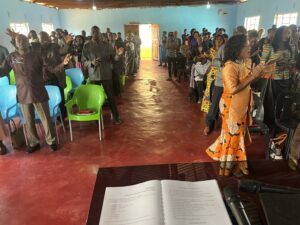 While in Honduras in the 1980s Gracie and I learned to engage illiterate and minimally-educated people in Bible study through spontaneous dramatic re-enactments of Bible stories.
While in Honduras in the 1980s Gracie and I learned to engage illiterate and minimally-educated people in Bible study through spontaneous dramatic re-enactments of Bible stories.
This month during our Certificates in Transformational Ministry at the Margins in Ndola, Zambia and Manenberg, South Africa, I found myself searching for ways to act out Bible stories
During these mostly spontaneous “bibliodramas” the Scriptures came alive afresh in surprising ways, creating bridges that made the ancient text suddenly obviously relevant.
In our CTMM module 2 on “Healing and Holistic Liberation” we treat sensitive topics like father and mother wounds, rejection, abandonment, and trauma, as well as spiritual warfare, healing and spiritual liberation.
When talking about spiritual warfare we use the story of Jesus taking his disciples to the “other side” of the Sea of Galilee, away from his prior ministry among his own people.
I spot a large table that I envision working as a make-shift boat, and ask for help to lay it on the floor. I invite twelve volunteers to serve as Jesus’ 12 disciples, and have them stand on the table like they’ve gotten in a boat. I find someone willing to be Jesus, who joins the disciples in the boat. I invite others to grab jackets or whatever they can wave around the “boat” to demonstrate wind and waves.
I invite someone to read Mark 4:35-37, which describes a fierce gale of wind, waves breaking over and filling the boat. The people with the coats wave them over the the twelve playing the disciples, who pretend to be full of fear. The man playing Jesus is laying down pretending to be asleep.
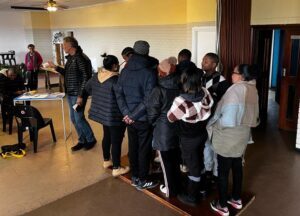 I invite people to consider whether they’ve ran into obstacles when they’ve moved away from their comfort zones to minister in unknown or especially challenging places. People identify easily with this, and give examples from their lives.
I invite people to consider whether they’ve ran into obstacles when they’ve moved away from their comfort zones to minister in unknown or especially challenging places. People identify easily with this, and give examples from their lives.
We read the next verse about Jesus being asleep, the disciples waking him and saying: “Don’t you care that we are perishing?!”
We talk about the feeling of being out there all alone when things get rough. The text gives people permission to identify their feelings of abandonment, their sense that Jesus is doing nothing to help. The disciples model a prayer of complaint that frees us to be real.
As we read what happens next the man playing Jesus gets up, rebukes the wind and sea, saying: “hush, be still!” Those waving jackets stop immediately. Then asks a hard questions to his disciples and us all: “Why are you afraid! Do you still have no faith?”
Those playing the disciples act out the reading of the final verse, pretending to be very afraid and amazed. They say to each other: “Who is this, that even the wind and the waves obey him.”
We end with a discussion about why we are still afraid and lacking in faith, and whether we can imagine stepping into Jesus-like fearlessness and authority.
Simple re-enactments make Scripture visible and more easily imaginable, helping us all see ourselves in the story.
The next study on the Gerasene demoniac in Mark 5 becomes even more interesting now that we know there’s been such opposition even getting to him. In Zambia two pastors from Zimbabwe who came to help teach and minister played Jesus and the demoniac (pictured below).
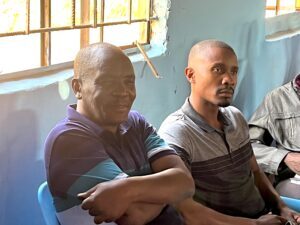 Tawanda (pictured on the right) plays Jesus, stepping off the boat onto the imaginary shore. He’s even himself 32, helping us envision what Jesus might have been like. Richard (left), plays the demoniac with an unclean spirit living in the tombs, who cut himself, cried out night and day, with no one able to subdue him. He runs to Jesus from the side of the meeting place and bows down before him, reading from my Bible:
Tawanda (pictured on the right) plays Jesus, stepping off the boat onto the imaginary shore. He’s even himself 32, helping us envision what Jesus might have been like. Richard (left), plays the demoniac with an unclean spirit living in the tombs, who cut himself, cried out night and day, with no one able to subdue him. He runs to Jesus from the side of the meeting place and bows down before him, reading from my Bible:
“What business do we have with each other, Jesus, Son of the Most High God? I implore you by God, do not torment me!”
I take note for the first time that a human being confessing Jesus as the Son of God is only possible by the Holy Spirit (Mt 16:17)! I invite people to consider that individuals we might consider the hardest cases can have the Spirit actively moving in their lives, revealing Jesus’ identity as God to them.
I ask Richard (the demoniac) why he thinks Jesus is tormenting him. Richard answers “because he thought Jesus would treat him like all the others had, trying to bind him shackles and chains.”
“Do people outside the church sometimes have bad experiences with people who call themselves Christians, causing them to expect judgment, condemnation, and exclusion?
The people watching are nodding, making comments showing they’re seeing the relevance. I read Mark 5:8 “For he had been saying to him…” and Tawanda, playing Jesus, spoke with a loud voice: “Come out of him you unclean spirit!”
I interview Tawanda about why he says this, and he says “because I can see that there is an evil spirit that is separate from this poor man, tormenting him.”
I continue as the narrator, reading: “And he was asking him,” and Tawanda addressed the demoniac Richard loudly:
“What is your name?”
Richard answers: “My name is Legion, for we are many.”
At this point I explain how “legion” refers to a Roman military unit of 5000 or so soldiers. There was known to be a Roman garrison stationed in that region. The Roman Empire dominated over God’s people Israel and the surrounding nations. This foreign, imperialist power appears to have especially oppressed this man.
Knowing that Ndola is in the heart of what’s called Zambia’s “Copper Belt” I ask what the name of the region’s largest copper mining company?
“Bwana Mukubwa” a few people yell out.
I ask Richard to replace “Legion” with this name in response to Tawanda asking him his name again.
“My name is Bwana Mukubwa!” he yells, and the whole audience breaks out into cries of surprise and laughter.
Suddenly this Scripture seems freshly relevant, as people tell how the mines were once nationalized when Zambia became independent from Britain. But then the IMF and the World Bank pressured the government to sell the mines to private mining companies. Bwana Mukubwa is now owned by Canadian multinational First Quantum Minerals, who take most of the profits out of the country.
I explained how the pig herders were likely raising pigs to feed the Roman colonizers. So Jesus’ agreement to send the unclean spirits into the pigs, and their subsequent self-destruction suddenly takes on a new meaning. Jesus’ exorcism frees a tormented individual from evil spirits associated with empire, and destroys those spirits together with the food supply of that empire. And Jesus elevates a marginalized individual over an economy!
Richard (the once demonized man) then takes a seat, clothed and in his right mind. As others playing the villagers tell Jesus (Tawanda) to get out of their region, Richard asks Tawanda (Jesus) if he can go with him.
At this point as everyone is expecting Jesus to agree to let this newly-liberated person join him as a disciple, Tawanda turns to Richard and and speaks out in a loud voice.
“Go home to your people and report to them what great things the Lord has done for you, and how he had mercy on you.”
At this point Richard begins to walk from one section of the gathering space to another, pretending to share the Good News, as someone reads:
“And he went away and began to proclaim in the Decapolis what great things Jesus had done for him, and everyone was amazed” (Mk 5:20).
In this way we were all able to see how Jesus’ liberating action empowers the most downtrodden people to step into their highest calling as missional agents, even apostles.
That evening after this session we visit a local faith community called Step to Heaven, where we worship together, followed by a time of prayer for people to step into Jesus’ healing ministry.
We witness many experience healing and deliverance, followed by a processional out into the streets of the neighborhood– of foretaste of the Kingdom of God.
We are just 4 days away from the start of our new fall series at The People’s Seminary: CTMM MODULE 1. We will launch this course coinciding with CTMM in Zambia, S Africa, Kenya, and 2 in Uganda).
Certificate in Transformational Ministry at the Margins (CTMM) This training is designed to further equip those already serving (or feeling called to pioneer work) amongst poor, under-reached, and marginalized communities.
It’s not too late to register and scholarships (partial or full) are still available directly on the registration page (drop down menu when you register)
NEW CTMM 2023 Module 1– Online (live) Certificate Program begins Sep 26
Register now: https://www.peoplesseminary.org/product-page/ctmm2022m1
12 Sessions: Tuesdays, 10:30 – 12:00 PM (PST)

[image error]
Visit our website for more information: http://www.peoplesseminary.org/
Please email document.write(str_rot13('<n uers="znvygb:pbzzhavpngvbaf@gvreen-ahrin.bet'));communications AT tierra-nueva DOT org" target="_blank" rel="noopener">communications@tierra-nueva.org if you need help with registration
August 6, 2023
Bridging the Divide Between the Academy and the Excluded
Throughout our lives Gracie and I have been struck by the enormous divide between the educated, and the poor and excluded– even within the church. A wealth of learning and valuable skills are held beyond the grasp of masses of impoverished people, unless deliberate efforts are made to effectively bridge these separations.
Last November I attended the annual meeting of the Society of Biblical Literature and American Academy of Religion in Denver. Though a Bible scholar by training, I felt out of place among the thousands of scholars– most of them professors in universities or seminaries. Encounters with some of the scholars eased some of my discomfort.
I perused the book tables of all the major theology and biblical studies publishers, checking out new commentaries and books of interest. I made my way to many seminars on specialized topics, listening for new insights on familiar or not-so-familiar texts. I felt like a metal detector, hoping to come upon some buried treasure in the various seminar rooms. I was listening hard for good news, but struggled to hear it, though I barely scratched the surface as there were hundreds of options each day to choose from.
One evening I attended a reception hosted by the Hispanic Theological Initiative, an organization that supports Latinx students and scholars. The ballroom was full of mostly well-dressed people, name badges identifying them and their institutions. Food and deserts were plentiful and wine and beer were in abundance. A woman began speaking from a microphone at the front, warmly welcoming everyone to the reception. It was a festive occasion.
The woman at the front then invited people to give their applause as she showed photos on a big screen of PhD students who had been awarded their degrees, followed by those who had become assistant professors, or moved from assistant professor to associate professor, or associate professor to professor, or become deans or presidents. She invited these people forward, and everyone clapped and cheered. It was a beautiful show of support.
I appreciate their mission statement to: “Increase the recruitment, retention, and graduation rates of Latinx PhD students across the nation by uniting and leveraging institutional resources (human, financial, and infrastructural)… and to “Increase the presence of Latinx leaders and faculty–especially, tenured faculty in seminaries, schools of theology, and universities.” Yet I couldn’t help but also feel overwhelmed with emotion as I found myself struck by the huge contrast between those celebrated and the people I serve here in the Skagit Valley.
I thought of the six or seven Mexican and Chicano inmates I visit in our local jail, most of whom are facing being “retained” by the prison system, and experiencing forced “graduations” from jail to years in prison. They are locked down 22-23 hours per day due to staff shortages. Once in prison they will join the millions of warehoused individuals, who have minimal opportunities for training of any kind in our increasingly cash-strapped and staff-lean mass-incarceration system.
After serving time, many will then be sent off to immigration detention, and they will eventually be deported to their countries of origin. Others will be released, deep in debt, often disconnected from family to the point of being homeless, with labels like “felon” and “ex-con” next to their name, blocking their future.
I thought of the farmworker families attending Tierra Nueva who go from the strawberry and blueberry fields in the summer months to pruning blueberry and raspberry plants and working the tulip fields during the cold winter months– never getting raises or promotions or congratulations.
The gap between what I experienced at the SBL/AAR annual meeting and the people we serve is immense. And the academic language I heard spoken as people read their scholarly papers would be completely unintelligible to most of the people we serve, as well as the world’s population. I lament the growing gap between the masses of men and women in our jails, prisons, homeless encampments, fields and factories– and the small elite of academic theologians and Bible scholars and their students.
As I stood near the back of the ball room considering these things, I suddenly noticed LED flameless candles flickering at the base of what turned out to be a memorial to Latinx theology professionals who had passed away. I approached the memorial and looked at the photos of the faces of person after person who had died, with their birth and death dates. I noticed that many had not lived long lives. Had they died of Covid? Cancer? In a car accident? There were no causes of death mentioned.
As I looked at face after face and read their names I was moved with emotion at all these lives cut short. I thought of my own mortality, and remembered a Scripture I often consider from Psalm 90:12 “So teach us to number our days, That we may present to you a heart of wisdom.”
I think of my own calling to bridge this divide– bringing the best biblical scholarship I can to the poor and excluded. I wonder how I can more effectively reduce this gap in the years of my life that remain.
We want to expand the offering of our Certificate in Transformational Ministry at the Margins to pastors and leaders serving excluded populations all over the world.
For years I have felt called to launch a prisoner pastoral ministry training program, and have since completed a five-volume Guerrilla Bible Studies series that includes 52 tried-and-tested discipleship Bible studies can be used as part of this training.
There, in Denver I met a woman named Sara who has since helped us launch a Certificate in Reading the Bible for Liberation through The People’s Seminary. We now have a distance-learning program in which a number of prisoners are currently enrolled.
I am moved by how Jesus himself shows God’s heart to reach the masses, as he went “around from one city and village to another, proclaiming and preaching the kingdom of God. The twelve were with him” (Lk 8:1).
Jesus was moved with compassion when he saw the crowds, who “were distressed and dispirited like sheep without a shepherd. Then he said to his disciples, “The harvest is plentiful, but the workers are few. Therefore beg the Lord of the harvest to send out workers into his harvest” (Mt 9:36-38).
Recruitment and training of these workers is urgently needed now, and like God who sends his best to the least, may we follow suit in whatever ways we are able.
June 17, 2023
Friendship with Jesus and with Each Other
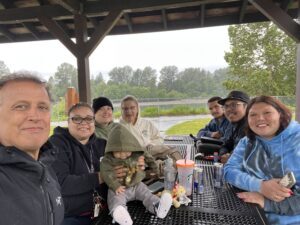 Many of Jesus’ words recorded in the Gospels directly challenge the idols of freedom, independence, and self-elevation rampant in Western culture today. Here are some of his words we have found particularly challenging lately in our weekly Bible studies at Tierra Nueva.
Many of Jesus’ words recorded in the Gospels directly challenge the idols of freedom, independence, and self-elevation rampant in Western culture today. Here are some of his words we have found particularly challenging lately in our weekly Bible studies at Tierra Nueva.
“This is my commandment, that you love one another, just as I have loved you. Greater love has no one than this, that one lay down his life for his friends. You are my friends if you do what I command you” (John 15:12-14).
That Jesus emphasizes his “commandment” and “doing what he commands” is foreign and even off-putting for most of us today. It seems to reinforce a common perception that being a Christian is all about obeying rules like the ten commandments.
If we take offense at this language and at the idea of friendship being contingent on “following orders,” we miss the radical positivity of the command: “that you love each other.”
Jesus has many other direct teachings stated as imperatives throughout the Gospels. For example:
“But I say to you who hear, love your enemies, do good to those who hate you, bless those who curse you, pray for those who mistreat you. (Luke 6:27-28).
These commands set disciples of Jesus apart from the eye-for-an-eye justice seekers, myth-of-redemptive-war advocates and law-enforcers.
What Jesus is saying here in John 15 is that doing what he says and loving one another makes us his friend (philos)—also meaning colleague, or companion. Loving one another makes us friends of Jesus, who himself embodies the greatest love, that of “laying down his life for his friends”—that is, us!
We certainly have benefitted from his friendship and stand to benefit much more, and to pass on that benefit to others.
Jesus’ next words clarify that he’s not about subjugating anyone like a boss or master in a master-slave relationship.
“No longer do I call you slaves, for the slave does not know what his master is doing; but I have called you friends, for all things that I have heard from my Father I have made known to you” (Jn 15:15).
Jesus invites us to imitate him in his own love relationship with the Father, which he includes us directly into.
“If you keep my commandments, you will abide in my love; just as I have kept my Father’s commandments and abide in his love” (Jn 15:10).
In John 15:16, right before he repeats: “This I command you, that you love one another” (15:17), he clarifies that he is personally recruiting us into a friendship movement that involves making a lasting positive impact, experiencing direct provision from God as our Father, and ongoing revelation from Jesus (which he receives from the Father).
“You did not choose me but I chose you, and appointed you that you would go and bear fruit, and that your fruit would remain, so that whatever you ask of the Father in my name he may give to you” (Jn 15:16).
He contrasts this directly with a warning about what his friends can expect from the systems of this world.
“If the world hates you, you know that it has hated me before it hated you. If you were of the world, the world would love its own; but because you are not of the world, but I chose you out of the world, because of this the world hates you” (Jn 15:18-19).
The contrast between loving our brothers and sisters and being loved as Jesus’ friends (and by our fellow sisters and brothers) and being hated by the world clarifies that we can’t have it both ways- being friends with Jesus and friends with the world. James 4:4 states it bluntly:
“You adulteresses, do you not know that friendship with the world is hostility toward God? Therefore, whoever wishes to be a friend of the world makes himself an enemy of God.”
Following Jesus involves listening to him and trusting, over our own reasoning at times. Jesus calls us to act in agreement with his desire (expressed in his teaching) above our will, doing things his way rather than our own way.
Jesus’ call to love each other and follow his instructions appears counter-cultural. We will be differentiated from our society and called out of normal conformity to the systems and ways of the world.
May we step more fully into friendship with Jesus and with each other as we take his commands seriously, deferring to him over our own will and ways.
April 21, 2023
No-barrier Church
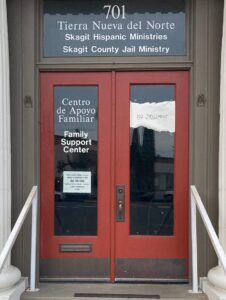 Many of the people involved in Tierra Nueva’s church and Bible studies are either still in active addiction or in some stage of their recovery process. In both cases people are accustomed to dealing with barriers to receiving benefits, keeping parental rights, employment or receiving or keeping their housing in a homeless shelter, subsidized housing or other services.
Many of the people involved in Tierra Nueva’s church and Bible studies are either still in active addiction or in some stage of their recovery process. In both cases people are accustomed to dealing with barriers to receiving benefits, keeping parental rights, employment or receiving or keeping their housing in a homeless shelter, subsidized housing or other services.
Regarding church people also assume there are barriers keeping them out, and even separated from God. Barriers that block people’s access to God and church must be deliberately identified and torn down!
Common barriers to social services include active addiction, criminal record, not having government-issue ID or legal immigration status, mental health issues, criminal history, active criminal warrants, and partners not in active recovery.
Many people who attend Tierra Nueva are all too familiar with high-barrier systems, such as in-patient residential and outpatient treatment programs, which some have been through numerous times. Some come who are enrolled in Skagit County’s alternative sentencing program called “Drug Court.”
Drug court holds participants accountable in a rigorous way that helps many. They require attendance at twelve-step meetings meetings hosted by CA (Cocaine Anonymous), NA (Narcotics Anonymous), or AA (Alcoholics Anonymous), and require random UA’s (urine analysis) to assure people are not using. Relapsing or failing to meet drug court requirements is punishable by jail time, court-mandated treatment or being kicked out of the program. Failing drug court means serving prison sentences for crimes for which they’ve pled guilty. Very few qualify for this high-barrier program.
Thankfully there are “low-barrier” shelters and other organizations that try to minimize requirements so more more people can access services. “Detox” is technically “low-barrier,” except that there are often no available beds!
Churches are often viewed as some of the highest-barrier places from which people assume they’d be excluded for a myriad of other reasons– tragically reducing its reach. We at Tierra Nueva are seeing the urgency of deliberately presenting as a “no-barrier” church; we seek to welcome vulnerable people in our community, those marked by rejection.
People usually assume they’re going to be judged and outright rejected if they open-up and reveal their true lives. Their natural inclination is to avoid church altogether. Their default is to self-protect, hiding their true selves, past histories and current life situation.
Single moms expect rejection for their “out-of-control” kids. Others would assume church people would exclude them for being an unmarried couple, smelling like weed, being a smoker or vaper, living in their car or on the street, using profanity, frequenting casinos, struggling with mental illness, ignorant of or unsure about Christian faith, not knowing the Bible, being overweight, having active warrants, certain tattoos, having children in foster care, having had abortions, gang affiliation, undocumented status…
These prejudices are regularly reaffirmed by the media, who remind people of the culture wars, highlighting many professed Christians positions against abortion, anti LGTBQ, tough on crime, pro-border wall, etc.
Sadly, people’s general perception of Christians as moralistic, legalistic, and hypocritical is continually reinforced. A friend of mine who has spent over 25 years in prison recently texted me his view of church:
“If you tasked me with finding a good person in a million but I could only hunt at churches or prison, I would choose prison. Because no one pretends to be good there. In fact, people exaggerate their badness in prison, and in church everyone presents as if they are on the path… I just find true convicts more honorable than rank and file Christians, and that certainly is true in their leadership.”
People coming in off the streets need positive eye contact from people who express authentic, non-judgmental presence. Barriers that block people from access to the church must be deliberately confronted through establishing a culture of welcome to people just as they are. This means welcoming people at the door or even outside, speaking that welcome out from the front, and creating an environment of no judgement that is consistent from start to finish.
This also means not identifying too overtly with typical recovery culture, and even overtly disassociated from its legalism (without condemning the need for higher barriers when needed to protect people in recovery). We announce Jesus as Savior of the world, friend of sinners, pursuer of the forsaken and lost, forgiver of our sins 70×7, canceller of our debts, who qualifies the disqualified.
We carefully think about the language used in worship songs, teaching, prayers, and liturgy so that it can be understandable to people who may have little formal education. Often people unfamiliar with church culture will not understand Christian lingo, including talk of lions, lambs, blood, the cross. Assume that most everything needs to be explained, always without condescension, with examples that people from the streets can identify with.
Messaging about God must continually express God’s unconditional, no-barrier love most visible in Jesus, which we must receive through the Holy Spirit over, and over again. And this same no-barrier love can then be embodied by the “body of Christ”—the church community itself.
This doesn’t mean we promote a boundary-less, anything-goes, free-for-all space! A safe, nurturing environment must be cultivated and continually guarded, with attention given to protecting people from anything predatory.
We carefully address legalism when it arises, and work to reign in hyper-spiritual language or manifestations that can scare or alienate people as they arise. We must creatively and continually re-state the liberating message that God qualifies us and saves us by grace, even as we attempt to embody the Gospel through our practices.
We end each Sunday with an “open-table” communion service before sitting down together for soup or a potluck. After gathering in a big circle, someone leads us all in a printed liturgy which includes this question and response.
Leader: Who is invited to this table?
People: “All are invited and welcomed to this table, regardless of who we are, where we have come from, or how we have been living our lives. God invites us here just as we are. God’s love for us is so strong that God became one of us so that when we put our trust in Jesus we are rescued from the rule of darkness, and enter into his abundant life, even now and forever.”
No-barrier mission is easiest when we take the church to the streets, homes, fields, homeless encampments, jails, prisons, and workplaces of our communities. Jesus himself embodied God’s movements towards people wherever they were: on the roads, beside the sea, in villages, homes, synagogues, public gathering places, in the company of the sinners of his time. Jesus compares himself to a shepherd who seeks after lost sheep until he finds them, placing them on his shoulders and celebrating their return with friends and neighbors.
As disciples of the Good Shepherd Jesus, we seek to do this through regular outreach on the streets, Bible studies in public parks, and visits to people in their homes. Being emissaries of a no-barrier God is a vocation that the Holy Spirit is continually renewing and inspiring, leading us outside across lines of difference, and welcoming people inside into communities of inclusion.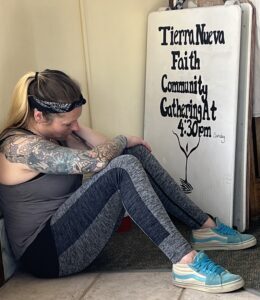
April 1, 2023
Word, Spirit, and Street Join Together in Manenberg, South Africa
I’ve just returned home after three weeks of trainings in Zambia, South Africa and Mauritius. Last week our team of trainers journeyed from Ndola to Cape Town to begin our People’s Seminary four-day module “Christian Identity and Mission in Scripture and Society” in the battle-worn township of Manenberg. There we saw how essential it is to bring together careful study of the Bible with the gifts of the Spirit together with street and Scripture-informed justice.
We were hosted by Tree of Life, a ministry to gang-involved youth that includes a vibrant faith community that’s been active in the township since 2013. We stayed in one of the gang-neutral Muslim neighborhoods where Tree of Life is based. According to Tree of Life’s website:
“Manenberg was established between 1966 and 1970, under the South African apartheid regime’s forced removals of ‘non-whites’ from the various suburbs of Cape Town that had been deemed ‘whites only’. Many families were ousted from their homes at the foot of Table Mountain, split up, and thrown into substandard housing with little formal infrastructure, 20km out of town. Midst the trauma of family dislocation, fear, and loss of safe space, gangs formed. Brotherhoods of disillusioned young men rapidly spread throughout Manenberg and the Cape Flats. The rotten legacy of Cape Town’s apartheid past has given rise to violence, crime and drug abuse in pandemic levels.
Today, Manenberg suffers daily, and the effects are seen throughout the whole family, fractured relationships, high levels of domestic abuse and a home environment that does not provide a safe place for young children to grow up.”
As our host Pete Portal drove us into the community it felt like we were entering a sort of run-down war zone. Churches and mosques were everywhere, often surrounded by high fences with razor-wire. The first thing we were told was to not walk around the township without being escorted by one of their local staff.
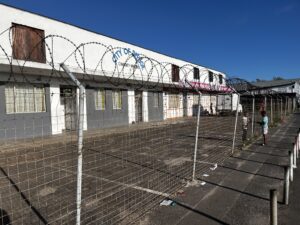 One of the first sights I noticed that embodied the contradictions is the photo above of a woman struggling with addiction leaning against a wall with John 1:5 written on it.
One of the first sights I noticed that embodied the contradictions is the photo above of a woman struggling with addiction leaning against a wall with John 1:5 written on it.
The next morning we started our Certificate in Transformational Ministry at the Margins with 35 or so people. The group was diverse, including staff, ministry workers from other organizations and a number of men and women in their twenties, who’d left their lives of drugs and gangs to live recovery-oriented community houses.
We began with worship and then launched into our first Bible studies on Genesis 1-4 and 12. To make the teaching more accessible to less-educated participants we used bibliodramas throughout.
Richard, our Zimbabwean pastor colleague played God in our session on Genesis 4. Rene, a tall, muscular German guy who does prison ministry played Cain. I gave him two apples to set them on a table in front of God (Richard). A young man who grew up on the streets of Manenberg played Abel. He brought a stuffed white lamb and laid it before Richard. Richard (God) looked upon Abel and his offering, and not upon Cain and his offering. Witnessing firsthand a contemporary manifestation of God’s unexplained preference for the underdog got everyone’s attention.
When Cain became angry, God approached him tenderly, and Richard asked him: “Why are you angry Cain?” This and God’s ongoing conversation with Cain showed everyone clearly how sin does not separate God from offenders. Rather we must expect God to show up and engage us when we’re angry or even committing acts of violence. “Do we expect God to draw close to us when we’re angry? Why are we angry?” we ask.
Acting out this text was especially powerful in a post-apartheid setting, where it’s still a shock to see God as a Black man and Cain as someone who looks like a privileged White South African. God’s looking upon the lower-status Abel surprised people, and his victimization led to a longer discussion on Jesus (and God’s) identification with Abel. Participants made these discoveries together in regular breakout groups.
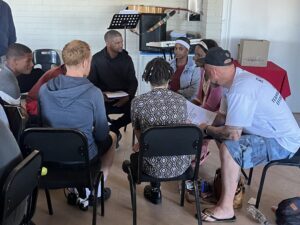
Later that afternoon one of Tree of Life’s local leaders, Rudy, gave us a walking tour through the township. As we walked we were struck by a feeling of despair, visible in garbage strewn fields that were often the sites of battles between gangs with names like the Americans, Hard Living, Clever Kids, Fancy Boys, Jester Kids, Dixie Boys, Junky Funky. We could see the relevance of contextual Bible studies like the one we’d just done for this community torn by violence.
 The next day we presented on Isaiah 1-39, looking at how the prophet articulated God’s opposition to the status quo of oppression, one of our particularly street/justice-oriented studies. A Black South African woman named Blondie, who’d done twelve years in prison and now works for a ministry to ex-offenders played the prophet Isaiah.
The next day we presented on Isaiah 1-39, looking at how the prophet articulated God’s opposition to the status quo of oppression, one of our particularly street/justice-oriented studies. A Black South African woman named Blondie, who’d done twelve years in prison and now works for a ministry to ex-offenders played the prophet Isaiah.
We looked at distinctions between the powerful and weak in Isaiah 1-5, and had people talk about the distinctions in Cape Town. The people identified some of the big corporate grocery story chains as embodying the powerful, and minimum-wage employees being today’s equivalents of the poor in Isaiah.
I’d asked a White Church of England clergyman whether he’d be willing to play the CEO of Woolworths, one of the powerful corporations identified by the group. He agreed and I began by interviewing him, asking him how much his yearly salary was. He told the group in an entitled way, and I asked the group what minimum-wage workers earners in a year. I then asked Blondie to stand up and speak out Isaiah 3:14-15 to the White Woolworths CEO.
At first she read the Isaiah 3 haltingly and softly, and I encouraged her to belt it out like she was Isaiah the prophet. She then boldly read:
“The Lord enters into judgment with the elders and princes of his people, “It is you who have devoured the vineyard; The plunder of the poor is in your houses. “What do you mean by crushing my people and grinding the face of the poor?” Declares the Lord God of hosts.”
Watching and listening to Blondie speak out these words to a White man was one of the most powerful moments of the training. The S. African course participants seemed especially gripped by this, and God’s clear siding with the poor against oppressors seemed to sink in deeply.
This was followed by my Swedish colleague Andreas’ powerful treatment of the prophet Isaiah’s own call in the temple in Isaiah 6. There when encountered by the Lord he saw himself as unclean, in no way superior to any he might otherwise discriminate against. This was followed by our South African colleague Colleen’s treatment of the Servant of the Lord in Isaiah 40-55, where we see how God recruited oppressed exiles for his missional movement to the world.
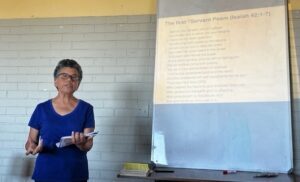
After that I did a teaching on Jesus’ baptism, where we saw how Jesus himself identifies with God’s enemies by symbolically dying there in the Jordan River, which was followed by his departure from his homeland—a necessity for anyone seeking to follow Jesus as a disciple.
In our next study Richard then played Jesus, and Andreaz the devil, and Richard modeled how to confront the tempter, making Jesus’ wilderness temptations come alive for people.
Colleen led the group in a spiritual mapping exercise, and people presented the Manenberg township and we prayed together.Another highlight was when we modeled how to pray for healing, and the first person we prayed for was healed before the group. Andreaz then invited someone who had never prayed for healing to come and pray for one of the housemothers of the men’s house, Fatima, who was suffering from back pain. One of the former gang-member street youth who lived in the house volunteered to pray, and I found myself worrying whether we were setting things up for an awkward failure.
I invited the young man to ask permission from Fatima to place his hand on her back to pray for her. He dutifully asked her and she gave him permission. I then invited him to order the pain to leave her back in Jesus’ name, based on Jesus’ imperatives when he healed people. He ordered the pain to go and we asked Fatima if she noticed any change. “No,” she said. “It’s still the same.”
I then invited the young man just to pray again however he felt led to pray, using his own inspired words. He prayed a beautiful prayer and Fatima suddenly declared with surprise and delight that all the pain was gone (see photo below).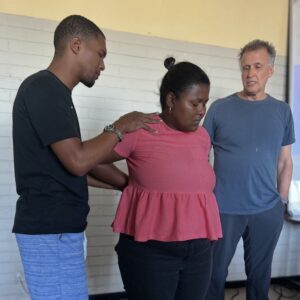 Within an hour of completing the training we learned that three people were killed in gang-related violence in the township. We ourselves saw the body of man covered with a white sheet at the crime scene, and learned he’d killed someone before being hunted down himself and beaten to death in front of some of Tree of Life’s local leaders’ house.
Within an hour of completing the training we learned that three people were killed in gang-related violence in the township. We ourselves saw the body of man covered with a white sheet at the crime scene, and learned he’d killed someone before being hunted down himself and beaten to death in front of some of Tree of Life’s local leaders’ house.
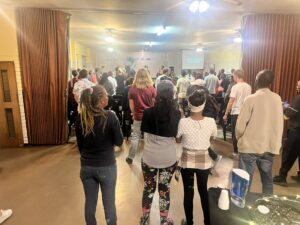 That night we gathered for Tree of Life’s monthly Kingdom Come worship service, where we lamented these deaths, interceded for the community and ended with a healing service. Many people came up for prayer, and the Spirit of God moved powerfully to bring relief. In places like Manenberg the urgency of proclaiming a liberating Gospel and seeing God’s Kingdom come is certainly apparent. May we continue to pray that God’s Kingdom will come, God’s will be done, on earth as in heaven, and open ourselves to being part of Jesus’ liberation movement.
That night we gathered for Tree of Life’s monthly Kingdom Come worship service, where we lamented these deaths, interceded for the community and ended with a healing service. Many people came up for prayer, and the Spirit of God moved powerfully to bring relief. In places like Manenberg the urgency of proclaiming a liberating Gospel and seeing God’s Kingdom come is certainly apparent. May we continue to pray that God’s Kingdom will come, God’s will be done, on earth as in heaven, and open ourselves to being part of Jesus’ liberation movement.
Take a look at our self-paced online Certificate in Transformational Ministry at the Margins here.
Check out my interview with Pete Portal on my Disciple podcast below, and last week’s interview with Richard Malitino.
Bob Ekblad's Blog
- Bob Ekblad's profile
- 11 followers


